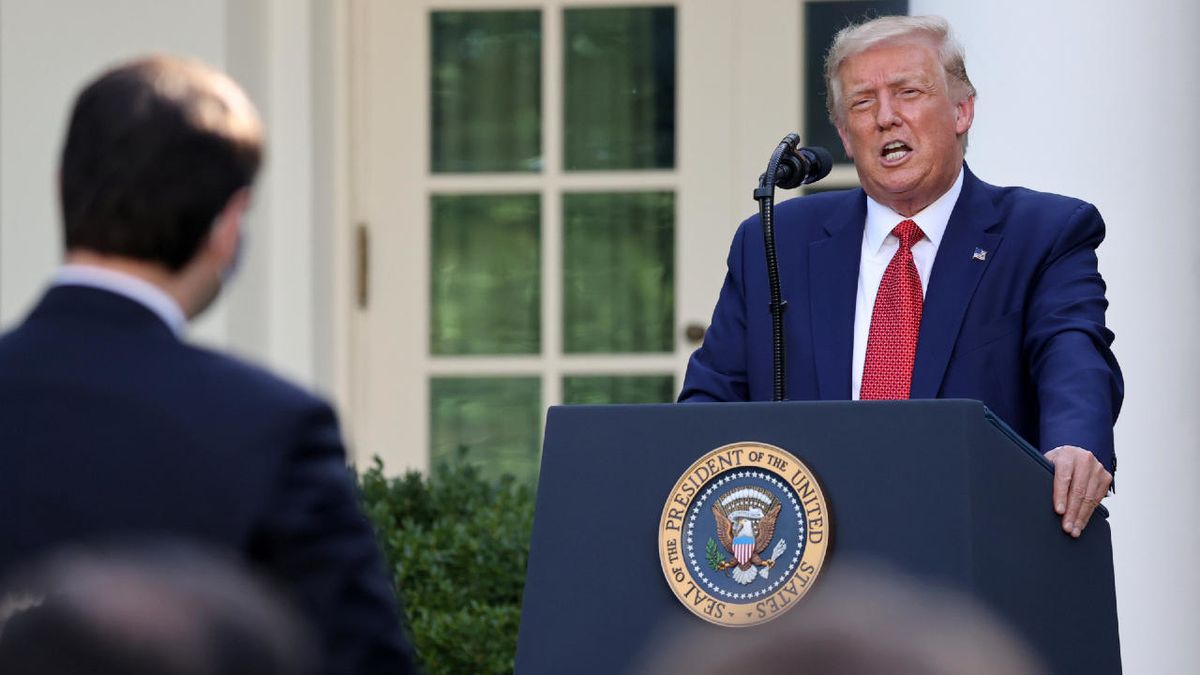Donald Trump ends preferential status for Hong Kong and hits Chinese officials with sanctions

A few minutes every morning is all you need.
Stay up to date on the world's Headlines and Human Stories. It's fun, it's factual, it's fluff-free.
On Tuesday, President Donald Trump announced the end of Hong Kong’s preferential trade status and signed a bill that would mandate sanctions against individuals and banks involved in the erosion of the city’s freedoms.
The bill that Trump signed, the “Hong Kong Autonomy Act,” was first introduced in late May and received strong bipartisan support in both the Senate and the House of Representatives, passing unanimously before both chambers of Congress.
The bill would impose mandatory sanctions on the Chinese officials responsible for imposing the security law, as well as on banks that provide financial support to those trying to undermine Hong Kong’s autonomy and on police officers who crack down on protesters.
People determined to be complicit in the acts outlined by this legislation would be prohibited from entering the United States and would have any US-based assets frozen. Furthermore, the banks targeted by this law would also lose control of US-based assets in addition to other punitive measures, such as being unable to receive loans from American institutions or carry out transactions that fall under US jurisdiction.
Trump also signed an executive order that would officially rescind Hong Kong’s special status as independent from China and halt any preferential trade treatment for the city, making good on previous statements that Hong Kong no longer enjoys a “high degree of autonomy” from China.
“Hong Kong will now be treated the same as mainland China,” said Trump in a news conference in the White House Rose Garden. “No special privileges, no special economic treatment and no export of sensitive technologies.”
Under this executive order, Hong Kong would also be subject to the same tariffs placed on mainland Chinese exports. It also revokes license exceptions for exports to Hong Kong as well as US training for the Hong Kong police force and other security agencies.
The two moves were the latest US efforts to “hold China accountable for its aggressive actions against the people of Hong Kong,” Trump said, following the enactment of China’s sweeping national security law in Hong Kong two weeks ago. The law would aim to punish acts of secession, subversion, terrorism and collusion with foreign forces that endanger the US’ national security.
In his statement, Trump said that Beijing’s imposition of the national security law “to fundamentally undermine Hong Kong’s autonomy, constitutes an unusual and extraordinary threat … to the national security, foreign policy, and economy of the United States,” adding, “I hereby declare a national emergency with respect to that threat.”
In retaliation, China once again implored Washington to stop interfering with their internal affairs and responded with their own threats of “necessary action to impose sanctions” on US individuals and entities, citing a need to “protect its legitimate interests.”
The Chinese Foreign Ministry issued a statement in response to Trump’s moves on Tuesday, saying that they “resolutely opposes it and condemns it.”
While details of the sanctions were not explicitly stated, officials did say that China’s actions would “resolutely” counter US attempts to “block China’s development,” before adding that such efforts are “doomed to fail.”
The Hong Kong government issued their own statement just a few hours later, saying that it would cooperate fully with Beijing’s retaliation against the US.
“We will not let US hegemony get its way,” the statement read. “The US side unveiled these measures in defiance of international law on the pretext of human rights, democracy and autonomy.”
“Its acts are hypocritical and will certainly cause very serious damage to American companies and citizens,” it added.
With this chain of events marking the latest indicator of the two nations’ plummeting relations, many are concerned about what these moves would mean for local residents and businesses based in the city.
“We are disappointed with such retaliatory actions, which can only exacerbate the economic hardship of the Hong Kong people, rather than help them,” said the Hong Kong General Chamber of Commerce, citing the recession brought on by the coronavirus pandemic.
Others also pointed out that while the US has taken an increasingly hard line approach while confronting China, these political moves also took care to reduce the impact on their economic and financial relationship.
“[The moves] definitely bite and goes further than what was anticipated some time ago,” said a top diplomat based in Hong Kong. “But in the end, the big question remains whether the US will do anything to undermine Hong Kong as the international financial gateway to China by restricting its access to the US dollar trade. That does not seem to be the case at this stage.”
Some have also highlighted the possibility that the US’ moves would violate international trading rules set by the World Trade Organization (WTO), which Hong Kong is a member of in its own right.
“If the United States ignores the basic principles of international relations and takes one-sided measures based on its internal law, then the country will violate the rules of the WTO and go against its own interests,” said Chinese Foreign Ministry spokesman Gao Feng in June.
If the US decides not to recognize Hong Kong’s independent status before the WTO, it would require support from two-thirds of the organization’s member states. This would open up the doors for China and its political allies to block this move.
Have a tip or story? Get in touch with our reporters at tips@themilsource.com




Comments ()